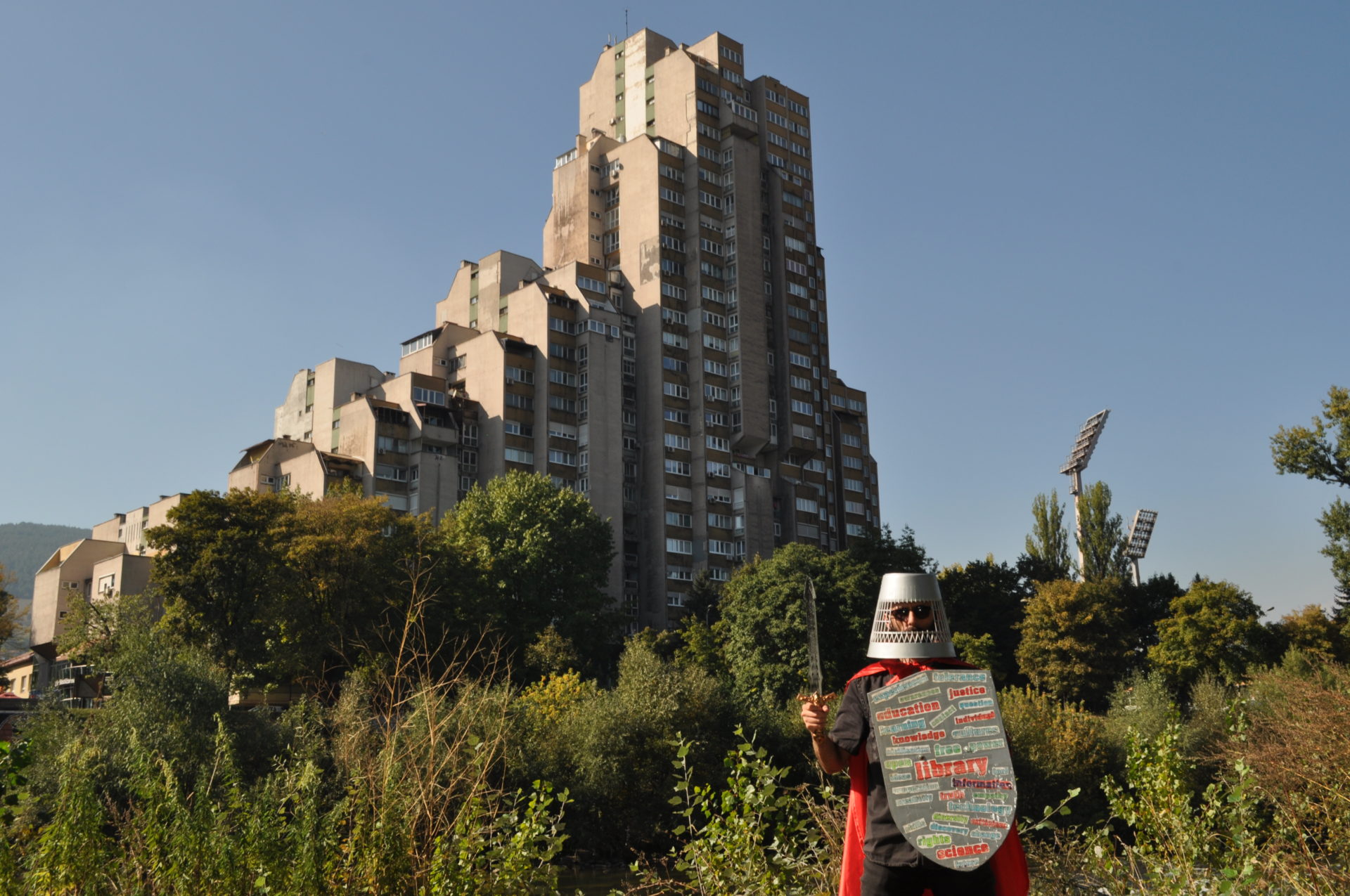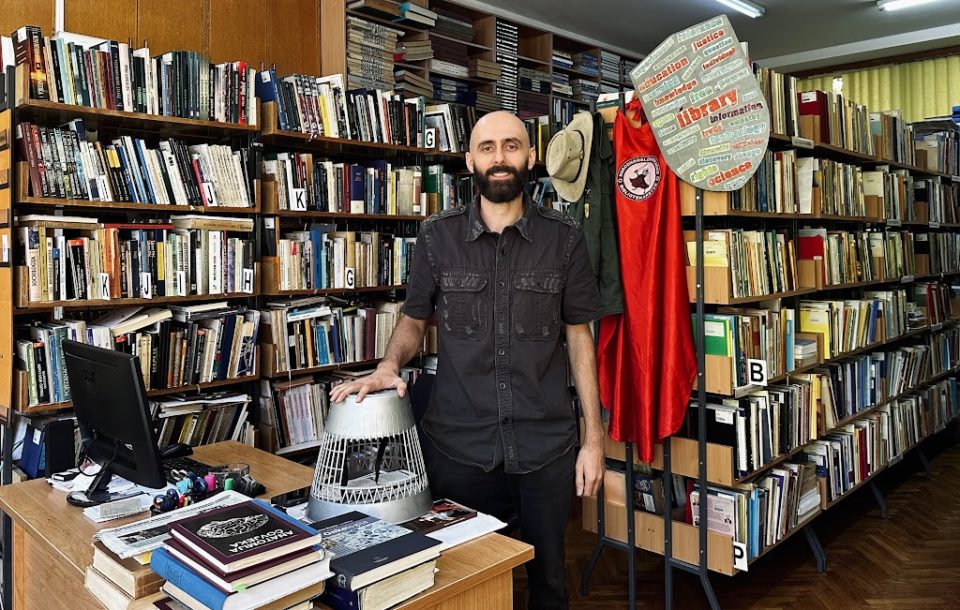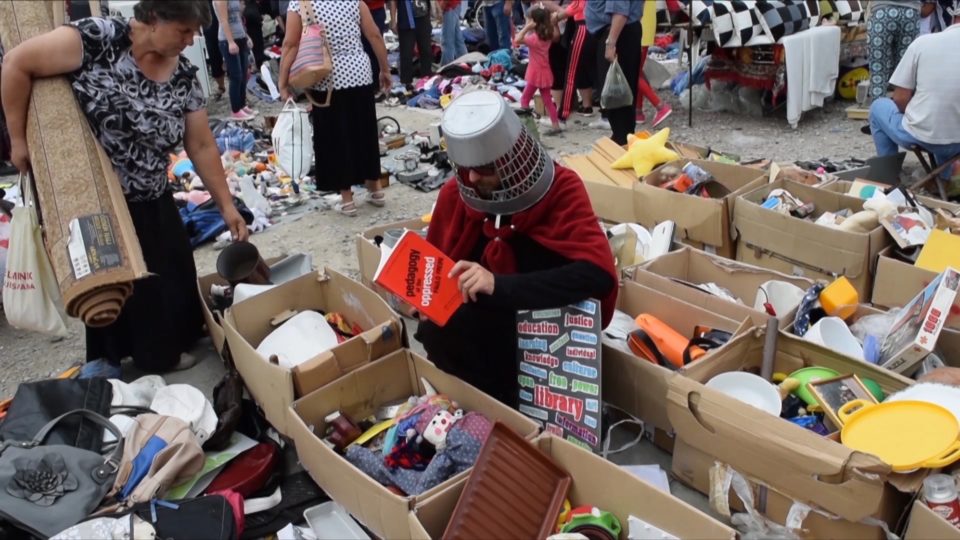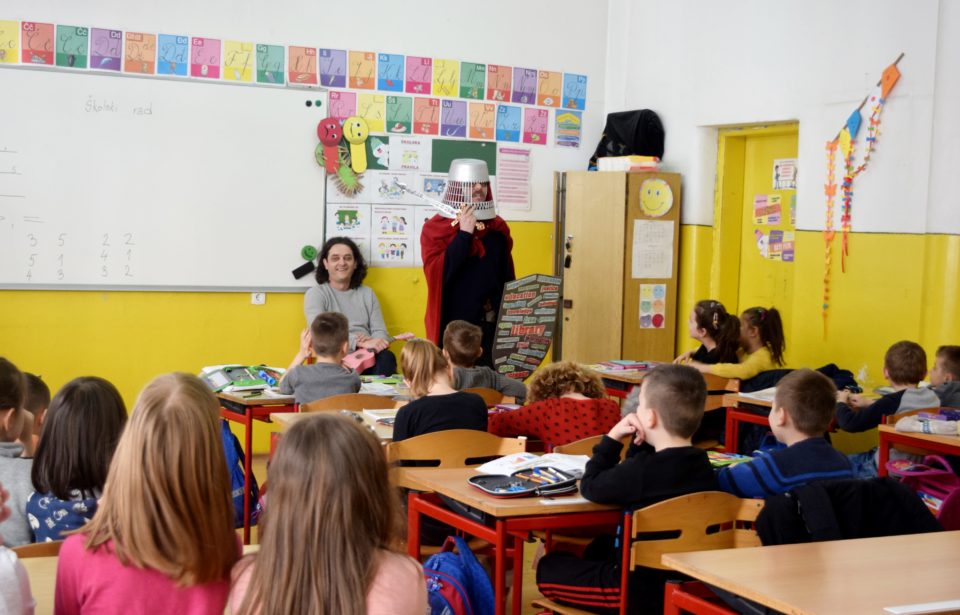
Mašo Mehmedović, who holds a Master of Arts in Comparative Literature, works at the Zenica City Library, where he has elevated his community engagement as the ‘Library Knight.’ Through his unconventional approach and dedication, this unique and inspirational mascot has become a symbol in the fight to preserve culture and education in the digital era.
Mehmedović is also the founder of the Movement for People’s Liberation Librarianship and the creator of the documentary film “Library Knight: Through Peaks and Wilderness,” which was released on his YouTube channel four years ago. This ‘knight’ captures public attention by participating in marathons, clad in his distinctive and improvised uniform – a red cape and a silver helmet made from a basket.
Beyond running marathons, Mehmedović serves as an ambassador for books and libraries, championing their ideals. He uses his indomitable optimism and positive energy to instill the love of libraries and books across generations. This represents a noble and heroic quest in the era of ChatGPT, Google, and other 21st-century conveniences.

In his self-employment journey and professional path, intertwining marathon running and marathon reading, the stories he tells are just as eccentric, creative, and chivalrous as his uniform.
The Persona of the Whimsical Knight
The knight’s adventures began with his degree in Library Studies at the University of Sarajevo Philosophy Faculty. It was during this time that Mehmedović personally witnessed the devaluation of library studies in Bosnia and Herzegovina as well as the marginalization of the country’s libraries, which are frequently shuttered, and the public’s lack of awareness regarding their significance and social role.
Driven by dissatisfaction and a desire for change, he decided to create the documentary “Library Knight.” The film features 27 interviews, with the whimsical knight character playing a special role, injecting action, dynamism, and entertainment throughout the narrative. Mehmedović notes that this documentary made the knight the mascot of the Movement for People’s Liberation Librarianship, proving to be an effective tool in attracting public attention. After film screenings throughout the region, invitations followed for the Library Knight to give lectures to children in several libraries and schools. Thus, the knight stepped out of the film and ventured into the world of community engagement.
He describes the Movement for People’s Liberation Librarianship as a campaign to raise awareness about the important role of libraries in society, emphasizing its innovative, unusual, and whimsical approach.
“The movement’s mission is to advocate for libraries to assume their essential and inherent role as liberating institutions for the people. Why do I claim they are liberating? Primarily because they provide us with free access to information and knowledge through which individuals can liberate themselves. They give us the opportunity to liberate ourselves from dangerous misinformation, simplifications, stereotypes, and prejudices through verified information, learning, and knowledge,” said Mehmedović.
His documentary film focuses on the challenges faced by libraries and librarians in Bosnia and Herzegovina. Although four years have passed since its filming, Mehmedović says that there have been no systematic changes. The law governing library activities, which has not been amended in the last 20 years, serves not as a means of regulation so much as a source of problems, creating chaos in the field of librarianship.
Seven years ago, the ‘Library Knight’ and several colleagues, with the help of a political representative and the media, initiated a proposal to amend a provision of the Law on Library Activities in the Federation of Bosnia and Herzegovina (FBiH). This proposal aimed to ensure fair employment opportunities in an environment where individuals with a university degree in librarianship are often passed over for those with political connections and only a 10-day course certificate.

While the draft was adopted, it has yet to reach the agenda for final approval. In pushing for its adoption, Mehmedović turned to the Institution of the Ombudsman for Human Rights. After four years of correspondence and meetings, the Parliament of FBiH was urged to promptly initiate procedural actions and make legal changes within 30 days, but nothing has been done yet.
Despite recognizing that his struggle may resemble fighting windmills, this knight believes that fundamentally, it is different. In his words, “The fight for justice and positive changes cannot be meaningless.”
An Old Basket, a Rusty Sword, and a Blanket-Cape
Mehmedović describes his journey from a self-employed ‘Library Knight’ to an employed librarian as difficult and filled with disappointment. “It wasn’t so much that I couldn’t get a job, but that alongside me and my colleagues, unqualified people were getting librarian positions through political connections… candidates from all possible professions were ending up in libraries—institutions that, in Bosnia and Herzegovina, are still ideal places for accommodating political cronies and non-cronies. So, it wasn’t easy to witness all of those rigged job competitions,” he stated.
Like a character straight out of Marvel, the ‘Library Knight’ was born. “I decided to ‘self-employ’ as the Library Knight. I took an old basket and a rusty sword from the basement, borrowed a blanket from mom for a cape, my father lent me his camera, and my neighbor Nedim provided a tripod. That’s how I put together the equipment and started filming the movie ‘The Library Knight.’”
His hands were full because he did everything himself. Not only did he play the knight, he was also the director, scriptwriter, editor, main cameraman, lighting technician, and sound engineer. He did all of it alone, but it paid off. After posting the first clips on social media, he received numerous positive reactions and invitations to appear in libraries. This is how he gained a certain popularity as the library knight.

Fortune smiled upon him in Zenica when a job opening was announced at the Zenica City Library. For the first time, he experienced a fair competition, where all of the interview candidates held degrees as librarians, as did the committee members and the library director himself.
“It seems that everything had to align for me to fairly secure the position I had been educated for,” said Mehmedović.
He doesn’t want to speculate about the future of Bosnia and Herzegovina but believes that without well-equipped and functional libraries, the future cannot be bright.
“Without libraries, it is impossible to build a healthy democratic society, which depends on well-informed and educated individuals. We shouldn’t worry about the future of libraries but about a future without libraries because these institutions are capable of adapting to any era while preserving their fundamental mission that has remained unchanged throughout history – to provide access to information and recorded knowledge for those in need,” concludes the ‘Library Knight.’






